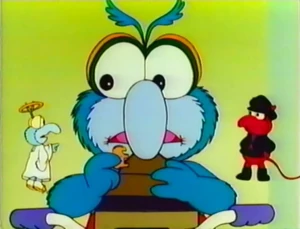mNo edit summary |
No edit summary |
||
| Line 1: | Line 1: | ||
[[Image:Gonzoad.JPG|thumb|300px]] |
[[Image:Gonzoad.JPG|thumb|300px]] |
||
| − | '''Psychomachia''' is a literary concept named for a Latin poem by Prudentius. The poem dealt with the inner conflict within one's soul, between virtue and vice, through allegorical representations. This concept of an inner struggle became key to the developing Christian religion, and was refined dramatically in the medieval [[Wikipedia:Morality play|morality plays]]. Works such as ''[[Wikipedia:Everyman|Everyman]]'', ''[[Wikipedia:Piers Plowman|Piers Plowman]]'', and ''[[Faust]]'' featured protagonists struggling with temptation, literally personified through the seven deadly sins ([[gluttony]], [[lust]], et. al). A variation of this involved the use of a "Good Angel" and "Evil Angel," one to encourage the tormented soul and the other to push the protagonist further along the path to ruination. |
+ | '''Psychomachia''' is a literary concept named for a Latin poem by Prudentius. The poem dealt with the inner conflict within one's soul, between virtue and vice, through allegorical representations. This concept of an inner struggle became key to the developing Christian religion, and was refined dramatically in the medieval [[Wikipedia:Morality play|morality plays]]. Works such as ''[[Wikipedia:Everyman (play)|Everyman]]'', ''[[Wikipedia:Piers Plowman|Piers Plowman]]'', and ''[[Wikipedia:Goethe's Faust|Faust]]'' featured protagonists struggling with temptation, literally personified through the seven deadly sins ([[gluttony]], [[lust]], et. al). A variation of this involved the use of a "Good Angel" and "Evil Angel," one to encourage the tormented soul and the other to push the protagonist further along the path to ruination. |
This eventually developed into the popular comedy cliche wherein a character has an angel on or above his shoulder, literally, and a devil. Frequently both angel and devil are identical twins to the protagonist, clad appropriately in either halo and wings or horns and pitchfork. This motif has permneated pop culture through cartoons, comic strips, and other media, including [[Muppet]] productions. |
This eventually developed into the popular comedy cliche wherein a character has an angel on or above his shoulder, literally, and a devil. Frequently both angel and devil are identical twins to the protagonist, clad appropriately in either halo and wings or horns and pitchfork. This motif has permneated pop culture through cartoons, comic strips, and other media, including [[Muppet]] productions. |
||
Revision as of 14:00, 31 August 2006

Psychomachia is a literary concept named for a Latin poem by Prudentius. The poem dealt with the inner conflict within one's soul, between virtue and vice, through allegorical representations. This concept of an inner struggle became key to the developing Christian religion, and was refined dramatically in the medieval morality plays. Works such as Everyman, Piers Plowman, and Faust featured protagonists struggling with temptation, literally personified through the seven deadly sins (gluttony, lust, et. al). A variation of this involved the use of a "Good Angel" and "Evil Angel," one to encourage the tormented soul and the other to push the protagonist further along the path to ruination.
This eventually developed into the popular comedy cliche wherein a character has an angel on or above his shoulder, literally, and a devil. Frequently both angel and devil are identical twins to the protagonist, clad appropriately in either halo and wings or horns and pitchfork. This motif has permneated pop culture through cartoons, comic strips, and other media, including Muppet productions.
- A chorus of admonishing angels appeared to Cookie Monster in Don't Eat the Pictures (1983).
- Baby Gonzo conjures his good and bad consciences in the Muppet Babies episode "The Great Cookie Robbery" (1985).
- Seymour appears in Devil attire as Jason Alexander's "Bad Conscience" in Muppets Tonight episode 108 (1996), with Pepe as his "Good Conscience".
